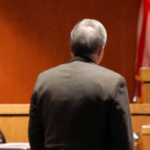Child Charged in Oakland County with Armed Robbery
The Oakland County Prosecutor’s office is notorious for ruthlessly prosecuting children. When a minor is charged in court, the outcome of their case can impact the course of their future.

What happens if your child is charged in Oakland County?
A 12-year-old girl who attempted to hold up a food market in Highland Township in early April pleaded guilty to one count of armed robbery in the Oakland County Juvenile Court. This child was charged in Oakland County and remained in custody until the next hearing and is being detained in the Oakland County Children’s Village.
Her sentencing, known as a “disposition” in juvenile court, is scheduled before the Hon. Mary Ellen Brennen on May 31, 2011. In juvenile court, sentencing is referred to as disposition. She will participate in psychological testing before the next hearing.
The girl’s parents are in the middle of a bitter divorce. She later told investigators she wanted money to help her mother make the house payment. She attempted to rob the store wearing a black bandana and carrying a loaded handgun. Employees in the store detained her until police arrived.
“We’re seeing so many cases with younger and younger people,” Oakland County Prosecutor Jessica Cooper said. Apparently, potential charges of home invasion are considered because police discovered that the girl stole the gun from one of her neighbor’s homes. If the prosecutor’s office was so concerned with children’s welfare, why charge the girl and then request psychological testing after she is convicted? In this case, the news reported that her parents were in the midst of a bitter divorce; there were terrible financial problems, and the parents were putting the girl in the middle of the chaos by telling her they may lose their home due to financial difficulties. Really? Does a 12-year-old child need that kind of stress? Why not ask the girl to undergo psychological before the charges are issued so that the prosecutor can make an informed decision and not rush to judgment? Requesting a psychological analysis after a conviction demonstrates backward thinking and prosecutorial double-speak – on the one hand, they are concerned about kids. In the next breath, they recklessly proceed with a prosecution without the benefit of complete information.

Common Juvenile Charges
- Theft, larceny, shoplifting, petty theft
- Underage drinking, OWI/DUI, drug possession
- Vandalism, trespassing, malicious destruction of property
- Assault, domestic violence, sexual offenses
Process for a Child Charged in Oakland County
When a minor, someone under 18, is accused of a felony or misdemeanor, they might be charged as a juvenile offender. Here are the basic steps in the juvenile delinquency process:
- Referral: When a juvenile (someone under 18 in Michigan) is suspected of committing a delinquent act in Oakland County, such as a felony or misdemeanor, a complaint may be filed with the Oakland County Circuit Court’s juvenile decision or law enforcement agency. The complaint can come from various sources, including parents, schools, or law enforcement officers.
- Intake: After receiving the complaint, an intake officer or referee reviews the case to determine whether formal charges should be filed. The referee considers factors such as the seriousness of the offense, the juvenile’s age, prior record, and the best course of action.
- Informal Adjustment: For minor offenses or first-time offenders, the intake referee may choose to handle the case through an informal adjustment called the consent calendar. This involves meetings between the juvenile, their parents or guardians, and the probation officer to discuss the offense, address the underlying issues, and develop a plan to prevent future delinquency. If the informal adjustment is successful, no formal charges are filed. The prosecutor can concur or object to an informal adjudication in most cases.
- Petition: If the offense is more serious or an informal adjustment is deemed inappropriate, the prosecutor may file a petition with the juvenile division of the Oakland County Circuit Court. The petition outlines the charges against the juvenile and summarizes the alleged delinquent act.
- Detention Hearing: If the intake referee or prosecutor believes that the juvenile poses a risk to themselves or the community, they may request a detention hearing to determine whether the juvenile should be held in a secure facility pending further proceedings or released to their parents or guardians.
- Adjudication Hearing: Similar to a trial in the adult criminal justice system, the adjudication hearing is where the court determines whether the juvenile is delinquent. The judge or jury examines the evidence and witnesses presented by the prosecution and defense. If the judge or jury finds the juvenile guilty beyond a reasonable doubt, it means they committed the charged offense.
- Disposition Hearing: After a guilty adjudication by trial or plea, a disposition hearing is held to determine an appropriate course of action. The disposition hearing is similar to an adult court sentencing hearing. The court considers factors such as the nature and severity of the offense, the juvenile’s prior record, their family situation, and any recommendations from probation officers or social workers. The juvenile defense attorney and the prosecutor have the opportunity to argue their respective positions. The court may order various dispositions, including probation, counseling, community service, restitution, or placement in a residential treatment facility.
- Review Hearings: Periodic review hearings are conducted to assess the juvenile’s progress and compliance with the disposition ordered by the court. These hearings allow the court to monitor the juvenile’s rehabilitation and adjust the disposition if necessary.

Juvenile Criminal Defense Attorneys
Both the juvenile and adult criminal justice systems in Oakland, Wayne, Macomb, Washtenaw, and Livingston Counties would be much more fair, thoughtful, and just if prosecutions considered a defendant’s personal circumstances before filing charges. Regrettably, this is not done, making it much more critical for criminal and juvenile defendants to work with persistent, assertive, and passionate juvenile criminal defense lawyers.
The Defense Team with LEWIS & DICKSTEIN, P.L.L.C. will take the time to talk with any potential client about their situation. We will answer all of your questions and address each of your concerns. A great defense lawyer will realize that the smallest detail can change the course of a client’s defense. Unless a lawyer is willing and able to listen to a client carefully, he cannot expect to provide the most effective defense.
Call us today at (248) 263-6800 for a free consultation or complete an online Request for Assistance Form. We will contact you promptly and find a way to help you.












